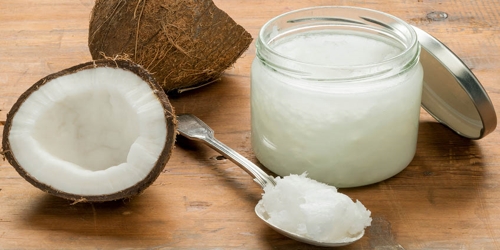Coconut Oil
Definition: Coconut oil is the oil extracted from the edible, fleshy “meat” of a coconut, which is actually the “kernel” of the coconut. It has a saturated fat content of 90 percent. Oils high in saturated fats have been found to increase the risk of cardiovascular and other diseases. It has various applications. Because of its high saturated fat content, it is slow to oxidize and, thus, resistant to rancidification, lasting up to six months at 24 °C (75 °F) without spoiling.
Virgin coconut oil is less processed than the refined version, and that preserves its sweet, coconut-y tropical flavor. Refined coconut oil goes through more processing, which leads to a more neutral smell and flavor. Because it doesn’t have that telltale tropical taste.
Coconut oil is a saturated medium-chain fatty acid, meaning the fatty acids chains are between 6-12 carbons in length. Almost all other natural unsaturated and saturated fats we consume are long-chain fatty acids. Coconut oil’s unique medium-chain fatty acid composition is what sets it apart as a nutritional powerhouse with properties, unlike any other fat we consume.

Nutrition Facts of Coconut Oil –
- Calories 121
- Protein 0 grams (g)
- Fat 13.5 g
- Saturated fat 11.2 g
- Carbohydrates 0 g
- Fiber 0 g
- Sugar 0 g
That’s very similar to other oils. For instance, a tablespoon of olive oil has 119 calories and 13.5 g of fat.
Here are some key points about coconut oil.
- Coconut oil has increased in popularity in recent years due to reputed health benefits.
- Overall, research does not currently appear to support increased consumption of saturated fats, including coconut oil.
- It can be a tasty addition to a number of recipes, but it should be used with care.
Benefits and Uses of Coconut Oil: Coconut oil has grown in popularity in recent years, amid claims that it can do everything from supporting weight loss to slowing the progression of Alzheimer’s disease.
People use coconut oil by mouth for diabetes, heart disease, chronic fatigue, Crohn’s disease, irritable bowel syndrome (IBS), Alzheimer’s disease, quality of life in people with breast cancer, thyroid conditions, energy, and boosting the immune system. Despite coconut oil’s high calorie and saturated fat content, some people use it by mouth to lose weight and lower cholesterol.

Coconut oil is sometimes applied to the skin as a moisturizer, for neonatal health, and to treat eczema and a skin condition called psoriasis. Coconut oil is also used in hair products to prevent hair damage.
- Controlling blood sugar: It appears to preserve insulin action and insulin resistance in mice.
- Increasing “good” cholesterol: A component in coconut oil has been found to give “good” HDL cholesterol “a nudge.”
- Preventing liver disease: It has reversed hepatosteatosis, a type of fatty liver disease, in rodents.
- Reducing stress: It has antistress and antioxidant properties, which could make it useful as an antidepressant, according to research in rodents.
- Healthy skin: It has been found to enhance protective barrier functions and have an anti-inflammatory effect on the skin in humans.
- Shiny hair: It makes hair shinier because it penetrates better than mineral oils.
- Weight loss: It has reduced obesity and promoted weight loss in mice.
Side Effects: Coconut oil is Likely Safe when applied to the skin. It is also Likely Safe when taken by mouth in food amounts. But coconut oil contains a type of fat that can increase cholesterol levels. So people should avoid eating coconut oil in excess. Coconut oil is Possibly Safe when used as a medicine short-term. Taking coconut oil in doses of 10 mL two or three times daily for up to 12 weeks seems to be safe.
Information Source:
















